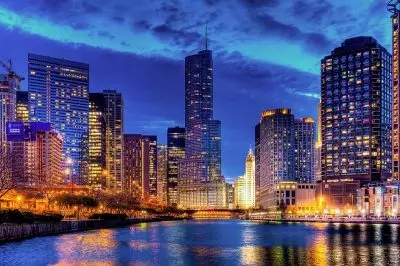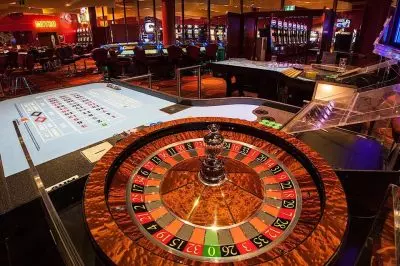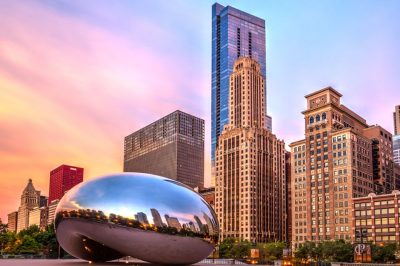 A significant budget deficit of $1.2 billion is currently being faced by the city of Chicago. Considering the very small chances of getting financial help from the Federal Government in 2021, the administration of Mayor Lori Lightfoot has been looking for a new source of revenue for the city.
A significant budget deficit of $1.2 billion is currently being faced by the city of Chicago. Considering the very small chances of getting financial help from the Federal Government in 2021, the administration of Mayor Lori Lightfoot has been looking for a new source of revenue for the city.
The 2019 decision of Illinois lawmakers to expand the state’s gambling industry could turn out to be the helping hand to pull the cash-struggling city out of the financial crisis that it has been dealing with, so Mayor Lightfoot officially gave a start to the process of establishing the long-awaited mega-casino in Chicago. As CasinoGamesPro already reported, before the city starts getting any money from the gambling expansion, the mayor and her team need to first decide where the new gambling venue is to be hosted.
Previously, Mayor Lightfoot has revealed some plans for using the new casino as a means to bring some economic development to a disadvantaged part of Chicago. This way of thinking has won her some allies in the City Council.
Of course, not everyone in the City Council backed the mega-casino project. According to some, the entire strategy of using gambling to reduce the city’s financial deficit, as the casino establishment is not likely to trigger further economic development or provide a long-term solution for budget shortfalls.
Proposed Chicago Casino Would Not Be Able to Solve All Financial Problems of the City, Experts Say
 So far, developers have proposed to use the Far Southeast Side area to host the casino as part of a resort-style development that would see not only a gambling venue being constructed but also a hotel, a golf course and various tourist attractions.
So far, developers have proposed to use the Far Southeast Side area to host the casino as part of a resort-style development that would see not only a gambling venue being constructed but also a hotel, a golf course and various tourist attractions.
City Council Alderman Susan Sadlowski Garza backed the proposed casino, saying that the Far Southeast Side area is the best place in Chicago to host the new mega-casino as it offers multiple amenities that could not be found in any other part of the city. On the other hand, such an investment would be able to make a difference for the neighborhood, she claims.
That is not the only benefit that proponents of the mega-casino in Chicago see in the gambling venue’s development. According to them, it is high time for the city to cut the long-time trend of local gamblers crossing the border with Indiana and spend their money at casinos there, such as the Horseshoe Hammond Casino that has been operational for more than 20 years.
Still, according to experts, making a certain area more attractive to gamblers rarely drives wider economic development because few of them spend money on any other businesses rather than the casino they are patrons of. Of course, this does not necessarily mean that building the Chicago mega-casino in the city’s downtown area would solve all financial problems of the city because the Central Business District may not be able to provide the necessary space for such an extensive project.
All of the abovesaid basically means that the administration of Mayor Lightfoot will have quite a difficult task to accomplish if they want to have a casino up and running. Furthermore, the future shape of the casino will depend on developers’ proposals, but first, the mayor will have to make a decision on whether her main objective is to pursue filling some budget holes by boosting casino revenue or seek further development for a certain neighborhood even if this would mean less revenue.
Request-for-Proposal Phase for the Chicago Casino Could Start as Early as H1 2020
 Several months ago, in August, the city administration called for potential developers to make their submissions of their vision for a Chicago casino by October 2020. As CasinoGamesPro revealed, a total of eleven groups responded. Some of them were MGM Resorts International, MGM Growth Properties, Hard Rock International, Wynn Resorts, Chicago Neighborhood Initiatives, R2Cos., DL3 Realty, Christiansen Capital Advisors.
Several months ago, in August, the city administration called for potential developers to make their submissions of their vision for a Chicago casino by October 2020. As CasinoGamesPro revealed, a total of eleven groups responded. Some of them were MGM Resorts International, MGM Growth Properties, Hard Rock International, Wynn Resorts, Chicago Neighborhood Initiatives, R2Cos., DL3 Realty, Christiansen Capital Advisors.
As confirmed by a mayoral spokesperson, the city’s administration had released a Request for Information to see what the intentions of potential developers are. Of course, reviewing the responses will take time for Ms. Lightfoot’s administration to make sure all aspects of the projects are taken into account. The spokesperson also confirmed at the time that the formal Request for Proposal phase may start in the first six months of 2021 at the earliest, with the move depending on the situation with the still ongoing coronavirus pandemic and the overall state of the capital markets.
However, city officials have not revealed many details about the project’s development so far, other than revealing the names of the companies that had declared interest to establish a casino in Chicago. For the time being, most of the potential investors have also refused to answer questions regarding their casino proposals.
So far, the non-profit development group Chicago Neighborhood Initiatives has backed the establishment of a casino venue near the Harborside International Golf Center. According to the group, this would be the best place for a casino and other amenities such as a hotel, some restaurants and a conference center, as the place offers a large amount of buildable land.
The Harborside site has also been highlighted by Mayor Lightfoot.
A Downtown Casino Would Probably be Most Profitable, Report Says
 Last year, the potential profitability of five potential casino sites, including the Harborside location, was analyzed by the Las Vegas-based consultancy firm Union Gaming Analytics. Under the proposed piece of gambling legislation that was signed into law by Illinois’ Government J.B. Pritzker last year, part of the revenue that is expected to be generated by a Chicago casino would be used to fund local policemen and firemen pensions.
Last year, the potential profitability of five potential casino sites, including the Harborside location, was analyzed by the Las Vegas-based consultancy firm Union Gaming Analytics. Under the proposed piece of gambling legislation that was signed into law by Illinois’ Government J.B. Pritzker last year, part of the revenue that is expected to be generated by a Chicago casino would be used to fund local policemen and firemen pensions.
The Union Gaming study was officially released by the Illinois gambling regulatory body in August 2019. Some experts found the city payout would mean that casino operators would have to face an effective tax rate of 72%, which would basically wipe out the revenue generated by a casino hosted at even the most attractive locations across the city. Earlier this year, Mayor Lightfoot convinced state legislators to adjust the rates in order to make the situation less burdensome for operators. Currently, the effective tax rate that would have to be faced by operators would equal roughly 40%, which according to Union Gaming, is much more attractive.
As far as the location of the Chicago mega-casino is concerned, city officials have explained that any site other than the five locations that had already been considered by Union Gaming could be taken into further consideration in a request-for-proposal process. On the other hand, possible resistance of local communities to a neighborhood casino may trigger the consideration of another site that is closer to the downtown part of the city.
Still, both the city authorities and the gambling companies that could invest in the planned development should be aware of the fact that a large downtown casino would probably be difficult to establish. Gambling facilities of a larger scale usually accommodate various amenities that require much space. In any case, wherever the Chicago mega-casino is hosted, neither the tax revenues that are set to be generated or the number of jobs expected to be created are likely to provide enough money to close the financial gap in the city’s and state’s budget.